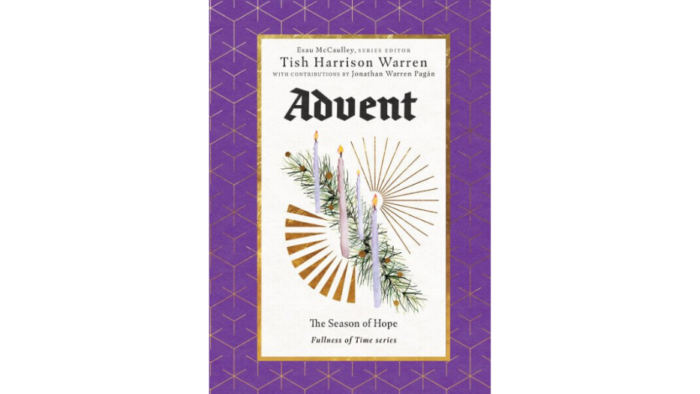Happy New Year! While December 31st is the end of our Gregorian calendar, the liturgical season of Advent, which begins on the fourth Sunday before Christmas, marks the start of a new year for Christians.
In her latest book, Advent, part of the Fullness of Time series by InterVarsity Press, author and Anglican priest (and dear friend of A Rocha) Tish Harrison Warren provides theological insights and personal reflections on this liturgical period. She observes that instead of creating sacred space for spiritual reflection, faith communities often fall prey to the commercialized frenzy of Christmas while secular culture mainstreams Advent calendars as another way to consume the holiday season. Thankfully, she also outlines a number of prayers and practices we can embody as a means of living out the hope, longing, and even mourning native to a season of waiting for the coming Lord.
Advent means “coming.” On page 11, Warren writes, “Part of why we observe Advent is to make Christmas weird again, to allow the shock of the incarnation to take us aback once more.” Christ’s first coming as a baby in Bethlehem is the reason for our Christmas celebrations, the singular event in history that people prayed for throughout the generations–the arrival of the Messiah. In the lead-up to December 25th, Advent readings invite us to place ourselves into the time before Jesus’ arrival, when the yearning for redemption and the return of a king to the throne of David was like a dark cold night without dawn for hundreds of years.
However, Advent is multilayered–the dawn has come, the Kingdom of Heaven brightening a broken world, but we need the return of the King to banish the darkness forever. Warren highlights the second coming of Christ as the focus of Advent throughout history and the third coming of Christ as his sanctifying presence with us in daily life. If Advent is solely about Christmas, the babe in the manger, we leave deeper discipleship and formation out in the cold. Generations of Christ-followers have practiced Advent as a way to keenly feel, lament, and work to restore the rough edges and rotten cores of life – injustice, oppression, greed, rage – while waiting, praying, and hoping for the return of the Prince of Peace.
Hope and peace are not words to use lightly. Today’s advertisements and commercials would have you believe that by purchasing a new item, whether it’s a truck, a cell phone, a burger, or a pharmaceutical drug, your life will be revolutionized and all will be right with the world. Read instead how Warren describes the “truest object of our hope,” infinitely better than whatever the next ad on YouTube is going to sell you:
We Christians believe that Christ will, as the Nicene Creed says, “come again in glory to judge the living and the dead and his kingdom will have no end.” This is God’s definitive response to the deepest longings of the human soul. It is our hope that truth, beauty, and goodness will last, and that evil, sorrow, and death will not. It is the promise that we and all of the cosmos are not doomed to fate and left on our own, but that we will be made whole and new.
Advent, ultimately, is a season of hope, which is why it is mostly about Christ coming in glory. This is the truest object of our hope. We celebrate that Jesus came in his incarnation and find comfort in how he comes to us in our daily lives, but all of our longings meet their end in Christ coming again, bringing healing, peace, joy, and an unimaginable wholeness in his wake. The final return of Christ is the undoing of cancer. It is the utter dismantling of white supremacy and racism. It is the delivery of justice for the victimized, for the weakest and the most vulnerable whom the powerful have brutalized with seeming impunity. It is the regeneration of dead coral reefs. It is the end of global pandemics. It is the vindication of those falsely imprisoned. It is the weeping of children giving way to their eternal laughter. It is the death of death. [pg 20-21]

This vision of our assured future feels very far off, particularly for those of us endeavoring to heal our declining relationship with all of creation. As we see more species moved from the Endangered Species List to the Extinct List, it is tempting to think we just need to work harder and faster. But Warren’s Advent insights expose these temptations that plague well-meaning Christians. Faster is not always better. Efficiency, productivity, and performance are not the winningest tools on our belt. The ends do not justify the means. Just look at Jesus resting, praying, fasting, spending time alone, feasting, and dying. Wasn’t he horribly inefficient for someone who was going to save the world, according to our own standards? Likewise, the Holy Spirit is not our “productivity coach” or “line manager” but our Advocate, Counselor, Encourager, and Source of Power.
Warren writes on page 3, “We begin our Christian new year in waiting.” Noticeably, the focus of Advent is on Christ’s first coming, his yearned-for return, and in how he is with us through the Holy Spirit today. Contrast this posture with our materialistic Christmas practices and modern New Year’s resolutions that frequently orient us towards self-improvement and self-importance. Observing Advent as much more than a countdown to Christmas–a countercultural challenge amidst the merry-making, shopping, decorating, and watching National Lampoon’s Christmas Vacation for the 35th time–can shape us into Christian communities reoriented towards expectant longing.
Lord, find us waiting with bated breath.
Advent is available online for purchase and in a local bookstore near you.









Add a Comment